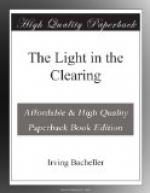I remember that I regarded it with a kind of awe because I had been forbidden to speak of it. The command invested Mr. Barnes’ nose with a kind of sanctity. Indeed it became one of the treasures of my imagination.
That evening I was chiefly interested in the stove. What a joy it was to me with its damper and griddles and high oven and the shiny edge on its hearth! It rivaled, in its novelty and charm, any tin peddler’s cart that ever came to our door. John Axtell and his wife, who had seen it pass their house, hurried over for a look at it. Every hand was on the stove as we tenderly carried it into the house, piece by piece, and set it up. Then they cut a hole in the upper floor and the stone chimney and fitted the pipe. How keenly we watched the building of the fire! How quickly it roared and began to heat the room!
When the Axtells had gone away Aunt Deel said:
“It’s grand! It is sartin—but I’m ’fraid we can’t afford it—ayes I be!”
“We can’t afford to freeze any longer. I made up my mind that we couldn’t go through another winter as we have,” was my uncle’s answer.
“How much did it cost?” she asked.
“Not much differ’nt from thirty-four dollars in sheep and grain,” he answered.
Rodney Barnes stayed to supper and spent a part of the evening with us.
Like other settlers there, Mr. Barnes was a cheerful optimist. Everything looked good to him until it turned out badly. He stood over the stove with a stick of wood and made gestures with it as he told how he had come from Vermont with a team and a pair of oxen and some bedding and furniture and seven hundred dollars in money. He flung the stick of wood into the box with a loud thump as he told how he had bought his farm of Benjamin Grimshaw at a price which doubled its value. True it was the price which other men had paid in the neighborhood, but they had all paid too much. Grimshaw had established the price and called it fair. He had taken Mr. Barnes to two or three of the settlers on the hills above Lickitysplit.
“Tell this man what you think about the kind o’ land we got here,” Grimshaw had demanded.
The tenant recommended it. He had to. They were all afraid of Grimshaw. Mr. Barnes picked up a flat iron and felt its bottom and waved it in the air as he alleged that it was a rocky, stumpy, rooty, God-forsaken region far from church or market or school on a rough road almost impassable for a third of the year. Desperate economy and hard work had kept his nose to the grindstone but, thank God, he had nose enough left.
Now and then Grimshaw (and others like him) loaned money to people, but he always had some worthless hay or a broken-down horse which you had to buy before you could get the money.




